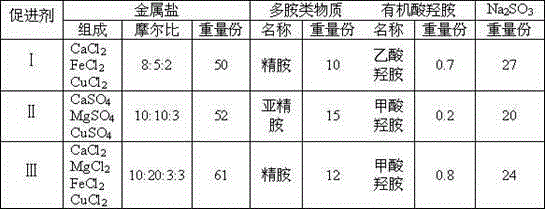Method for controlling nitrification reaction progress in sewage biochemical treatment process
A technology of biochemical treatment and nitrification reaction, applied in biological water/sewage treatment, water/sludge/sewage treatment, sustainable biological treatment, etc. And other issues
- Summary
- Abstract
- Description
- Claims
- Application Information
AI Technical Summary
Problems solved by technology
Method used
Image
Examples
Embodiment 1
[0021] Example 1 Control of SBR denitrification system in a sewage treatment plant
[0022] A sewage treatment plant mainly produces ammonia-containing wastewater produced in the process of nitrogen fertilizer production, and adopts SBR process for treatment. The average influent ammonia nitrogen concentration is 475mg / L, and the COD concentration is 1100mg / L. After conventional treatment, the average removal rate of ammonia nitrogen is about 80%, and the nitrification rate is only 20%. Every time the water is changed, the concentration of the accelerator in the treatment system is 30mg / L, and the nitrous bacteria growth accelerator I is added. The operating conditions are temperature 29°C, pH 7.8-8.2, dissolved oxygen 0.5-2.0mg / L After 5 days of operation, the nitrification rate increased to 80%, and the removal rate of ammonia nitrogen reached more than 85%, realizing stable short-range nitrification and denitrification.
Embodiment 2
[0023] Example 2 Control of A / O denitrification process in a sewage treatment plant
[0024] The ammonia nitrogen removal rate of the A / O denitrification system of a sewage treatment plant was over 80% and the total nitrogen removal rate was less than 60% during long-term operation. A large amount of unreacted nitrate nitrogen was detected in the system. According to the accelerator concentration in the treatment system is 25mg / L, add nitrous bacteria growth accelerator II, the operating conditions are temperature 30°C, pH 8.0-8.8, dissolved oxygen 0.1-1.5mg / L, and the removal rate of total nitrogen after stabilization It is always above 85%, and the nitrification rate can reach more than 80%, indicating that the total nitrogen removal rate is significantly improved after adding the accelerator, and the nitrification reaction process is stably controlled in the nitrous acid stage.
Embodiment 3
[0025]Embodiment 3 A certain sewage treatment plant adopts the control of BAF technological process
[0026] A sewage treatment plant adopts the BAF process in the process of advanced sewage treatment. The average concentration of ammonia nitrogen in the influent is 75mg / L, and the concentration of COD is 150mg / L. After treatment, the average removal rate of ammonia nitrogen is about 80%. According to the concentration of accelerator in the treatment system is 10mg / L, nitrous bacteria growth accelerator III is added, and the operating conditions are temperature 25°C, pH 7.5-8.0, dissolved oxygen 1.0- 2.0mg / L, after running for a period of time, the nitrosation rate increases to 90%, and the removal rate of ammonia nitrogen reaches more than 90%.
PUM
 Login to View More
Login to View More Abstract
Description
Claims
Application Information
 Login to View More
Login to View More - R&D
- Intellectual Property
- Life Sciences
- Materials
- Tech Scout
- Unparalleled Data Quality
- Higher Quality Content
- 60% Fewer Hallucinations
Browse by: Latest US Patents, China's latest patents, Technical Efficacy Thesaurus, Application Domain, Technology Topic, Popular Technical Reports.
© 2025 PatSnap. All rights reserved.Legal|Privacy policy|Modern Slavery Act Transparency Statement|Sitemap|About US| Contact US: help@patsnap.com

